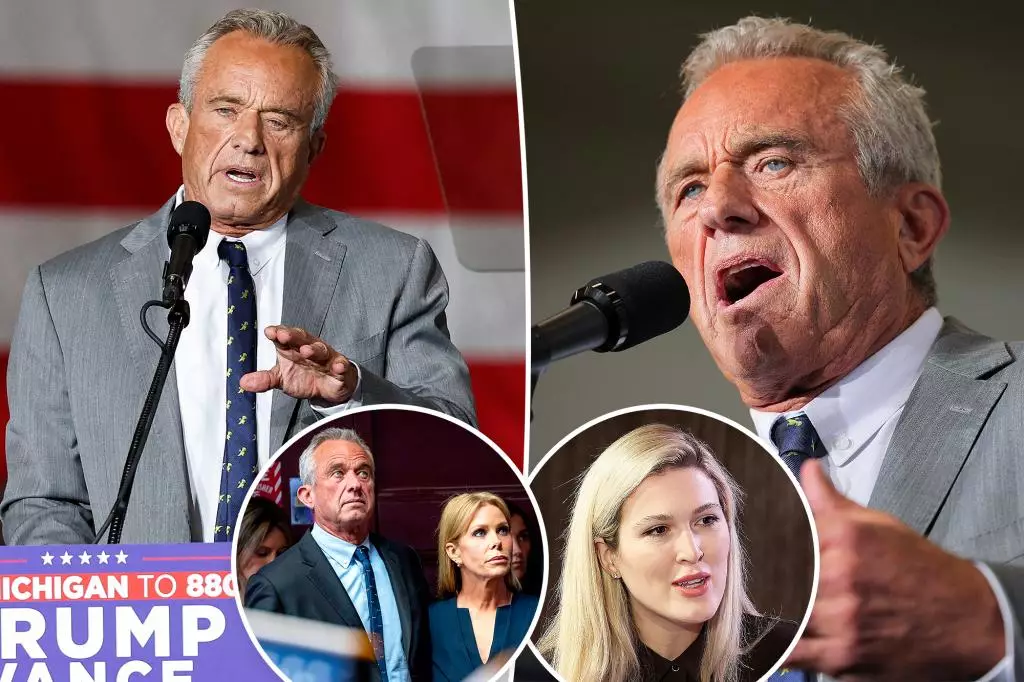In the world of politics, few figures manage to evoke as much passion and controversy as Robert F. Kennedy Jr. Recently, the scion of one of America’s most iconic political families caught attention not only for his stance on health and nutrition but also for a personal scandal involving alleged sexting with Olivia Nuzzi, a writer for New York Magazine. This incident, however, did little to deter him from making an appearance at a Senate roundtable on nutrition in Washington, D.C., where he was described as appearing unfazed. This juxtaposition of public demeanor and personal turmoil presents an intriguing lens through which to analyze his character and the political landscape in which he operates.
Kennedy, now 70, appeared at a Senate discussion titled “American Health and Nutrition: A Second Opinion,” alongside notable figures such as Jillian Michaels, a well-known fitness personality, and Dr. Jordan B. Peterson, a psychologist known for his often controversial opinions on various subjects. While the discussion addressed critical issues regarding American health and the influence of corporate interests, glimpses of the underlying scandal loomed in the background.
It is essential to recognize the resilience that Kennedy has exhibited through this scandal. Reports from insiders at the nutrition panel suggested he appeared “great,” a testament to his ability to compartmentalize personal distress in the face of professional obligations. How does one navigate such dualities? To many, Kennedy represents a complex figure who is balancing a legacy steeped in public service with contemporary challenges of public perception and personal crisis.
Despite the distractions of his alleged affair, Kennedy remains committed to his advocacy against what he terms “ultra-processed food” and the toxic substances that contribute to America’s health crisis. His recent remarks claiming that the USDA and FDA have been “captured” by corporate interests speak to a broader narrative of distrust in institutions designed to protect public health. Such bold statements highlight not only his views on systemic corruption but also his broader vision for a healthier America—a vision he passionately advocates even in turbulent times.
The Conflicted Figure of RFK Jr.
Kennedy’s endorsement of Donald Trump after suspending his presidential campaign marked another sharp turn in his narrative, which often elicits mixed reactions from the public. During his tenure in public life, he has shifted his political alliances and strategies, prompting critics to question his authenticity. Yet, his message regarding health has maintained a consistent focus: the call for a return to a more natural, less processed diet seems to resonate with a segment of the population that is increasingly frustrated with the current state of public health.
In interviews, Kennedy candidly speaks about the disconnect between individuals and the food systems designed to nourish them. His provocative claim that obesity was “almost unknown” 120 years ago raises alarm bells for many. While some praise his insightful commentary, others see a controversy-laden figure merely playing to the gallery for political capital.
Despite his personal setbacks, Kennedy’s participation in health discussions indicates his ambition to position himself as a leading voice on nutrition and health reform. He has garnered support from diverse panels comprising influencers in health and wellness, solidifying his credibility in a field that is often seen as saturated with misinformation. The self-proclaimed advocate for American health has made it clear that he aims to disrupt the narrative surrounding food regulation and corporate influence.
In light of recent events, it remains crucial for voters and constituents to contemplate the broader implications of Kennedy’s controversial stances and personal decisions. The juxtaposition of his public advocacy with private actions prompts critical questions regarding leadership integrity and the impact of personal scandals on political careers.
As Robert F. Kennedy Jr. navigates the tumultuous waters of his personal life and public persona, his ability to maintain focus on pressing health issues may determine not only his future in politics but also his legacy as an advocate for American health. Whether one views him through the lens of admiration or scrutiny, it is undeniable that the complexities enveloping his life make him a fascinating figure in contemporary American discourse.

